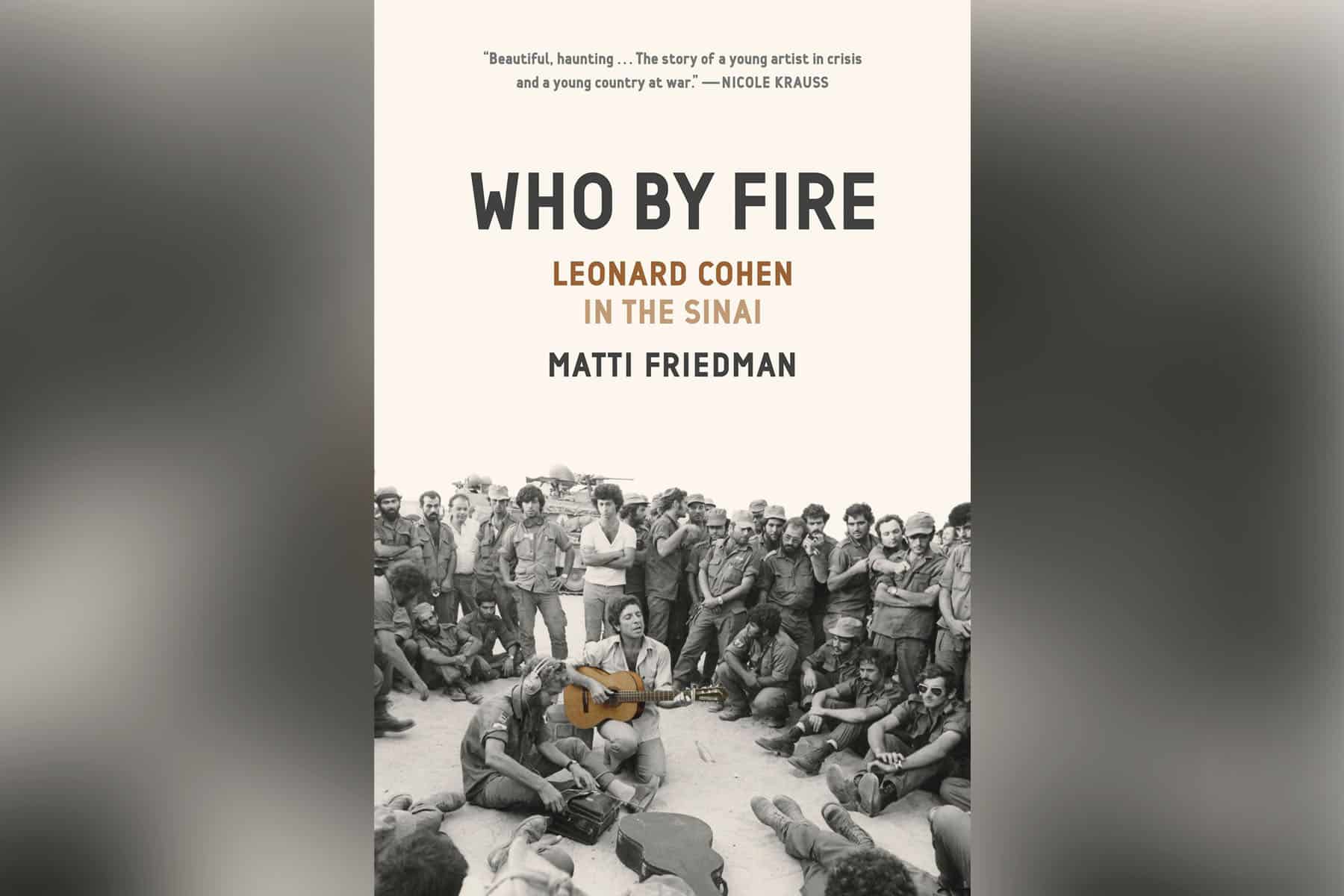
When many Americans think of entertaining the military troops in a time of war, we recall the USO tours that took place during the Vietnam War and through Operations Desert Storm (Gulf War I), headlined by Bob Hope with an array of American celebrities who performed for the men and women deployed overseas. Those shows were highly produced events, staged with adequate sound systems and proper lighting, in front of audiences of active military men and women, numbering in the thousands.
Contrast those spectacles with the impromptu concerts given by iconic Canadian poet-singer Leonard Cohen through the Sinai Peninsula during the 1973 Yom Kippur War. Cohen’s performances, his state of mind, and the harsh realities of the Yom Kippur War are the subject of Matti Friedman’s recent book, “Who By Fire.” Friedman toggles back and forth between grueling details of the war, its toll on young soldiers, and Cohen’s music and its impact on those soldiers, as well as the war’s impact on Cohen and his music, including the significance of the liturgy of Yom Kippur. The book is a revealing and absorbing account of those few short weeks when the fate of Israel was at the precipice, but its revelations will stay with the reader for much longer than it takes to read the slim volume.
Friedman had access to one of Cohen’s unpublished manuscripts tucked away with his papers housed at McMaster University in Toronto. The manuscript is part diary, part poetry and part fiction. And, courtesy of the Cohen family, Friedman delved into the pocket notebooks that Cohen carried with him throughout his career. The notebooks are more like journals and enabled Friedman to distinguish between the diary writings and the fictional parts of the manuscript. They also enabled him to find people who were soldiers during the Yom Kippur War and who heard Cohen play in the Sinai.
Cohen’s journey to Israel, which Cohen called his “myth home,” was a type of escape from the life he was living on the Greek island, Hydra, with his then partner and their new-born child and from music. He was among many Israelis who had scattered across the globe urgently trying to get home to return to their units and take their place in the war. His purpose in going was to work on a kibbutz to replace those called to the war, and music was so far from his mind that he didn’t bring a guitar. However, a serendipitous meeting, of which there are several different accounts, at Café Pinati with Israeli singers Ilana Rovina and Oshik Levi led to Cohen joining the informal tour that also included a young Matti Caspi.
Friedman details some of the battles and many of the casualties and the singer’s proximity to both. Most of the concerts were informal and intimate, with soldiers sometimes departing for battle after listening to songs performed by Cohen and the Israeli music artists. Other times, the soldiers had just returned, shell-shocked from watching their friends fall, some literally from the sky. Cohen was known to many Israelis. His songs “Suzanne” and “Bird on a Wire” were familiar to them and many young women had Cohen’s early albums. When he appeared in concert with the other Israeli artists, there was surprise and delight from the soldiers.
There is no doubt that Cohen’s experiences during the Yom Kippur War affected his music.
There is no doubt that Cohen’s experiences during the Yom Kippur War affected his music. The song “Lover, Lover, Lover” comes out of the war concerts. Caspi recalls that Cohen worked on the song, changing the lyrics as the concerts progressed. Friedman identifies a lost verse found in one of the notebooks: “I went down to the desert to help my brothers fight.” But the refrain, “Yes and lover, lover, lover … Come back to me,” is indicative of Cohen’s state of mind. He could not escape his history, his tradition and his duty. And there can be no question that Cohen’s song “Who By Fire,” his take on the Unetaneh Tokef, comes out of his Yom Kippur War experience. As the prayer was being recited in Israel that Oct. 6, 1973, the first indications of attacks in the Sinai and Golan Heights were coming in. “Who will live and who will die … who by fire, who by water.” The Book of Jonah and the priestly blessing, when those members of the priestly tribe—the Cohanim (to which Leonard Cohen belonged)—bless their community also link Cohen inextricably with Yom Kippur.
Friedman’s compelling narrative of a pivotal war that left an indelible mark on a nation, the Jewish people and one musician draws readers in and doesn’t let go of us until the last page has been finished.
Melissa Patack Berenbaum is an attorney living in Los Angeles.






















 More news and opinions than at a Shabbat dinner, right in your inbox.
More news and opinions than at a Shabbat dinner, right in your inbox.